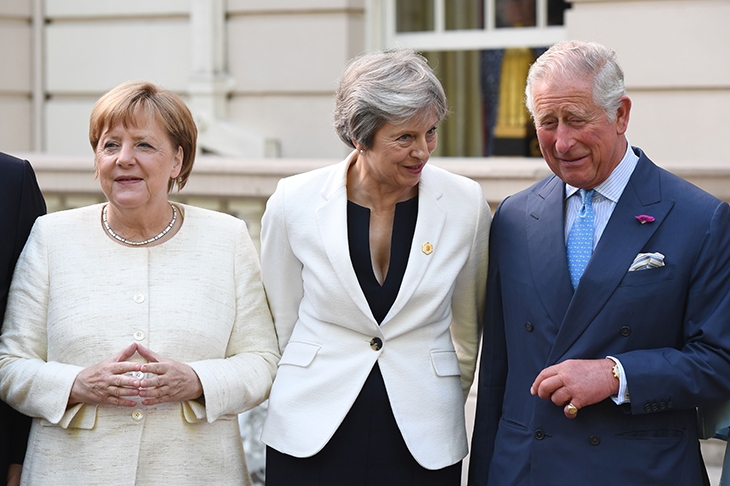Republicans hate to admit it, but the stability brought by the long reign of that most careful of monarchs Elizabeth II has helped Britain manage the decline from empire to middle-ranking power surprisingly well. As the Treason Act of 1351 is no longer in force, and to ‘compass or imagine’ the death of the sovereign no longer carries the death penalty, I can state the obvious. Her Majesty is 92. She is entering her last days as Brexit threatens the peace in Ireland and the union with Scotland, and divides England and Wales into hostile camps.
A vigorous PR campaign is underway to persuade us that now is not the worst possible moment for her zealous and under-educated son to succeed. The Prince promised the BBC that he would stop interfering in politics when he became king. His courtiers, meanwhile, use Robert Jobson’s soft-focused portrait of the Prince to reassure readers that he will not seek to divide a fraying country further. Both fail because they do not accept the traditional limits on monarchical power. It is not that Prince Charles doesn’t understand Walter Bagehot’s definition of the monarchy as the ‘dignified’ branch of the state that symbolises a country that politicians govern. He gives every appearance of rejecting it.
His contempt for politicians is this book’s most striking feature. The Prince lectures Sadiq Khan on his plan to solve London’s housing crisis. ‘I can’t seem to get through to him,’ he complains. When world leaders politely ignore him too, he does not take the hint that it is not his place to determine policy, but damns them as ‘silent cronies’, whose company is ‘excessively demoralising’.
A memo released in 2004 revealed his self-confidence. The young have ideas above their station, he opined, because ‘child-centred learning’ had taught them they can ‘all be pop stars or High Court judges or brilliant TV presenters — heads of state! — without ever putting in the necessary work or effort’.
The Prince lacks the self-awareness to know that no idea is more ‘child-centred’ than the hereditary principle. He appears to have convinced himself that he will inherit because of his work and effort, and become the world’s first self-made monarch. Most disturbingly, he gives every indication that he will use his position to promote an ideology that is so strange hardly anyone grasps it. His support for the environment, Georgian architecture and organic biscuits make him seem a ‘conservative’ in the broadest sense. As the few people who have read his book Harmony know, his world view isn’t so much old-fashioned as pre-scientific. It is from his combination of mysticism and obscurantism that the Prince’s otherwise startling denunciation of Galileo for introducing ‘mechanistic’ thought into a previously pure world flows. Hence his support for every variety of ‘alternative’ quackery and pseudo-science, and his hope that we will ‘grow numb at the sacred presence all traditional societies feel’.
To call Prince Charles a conservative thinker is like calling a flat-earther a conservative geographer. He most admires primitive societies dominated by shaman kings — who look rather like him — and inevitably regards knowledge as suspect.
His former aide Mark Bolland may have revealed that politicians and civil servants let him know ‘how concerned they were’ about his political meddling, but the Prince and his courtiers believe he has done nothing wrong in the 70 years he has waited to be king. They cannot be clearer that he, rather than the cabinet or Parliament, will decide what is meddling when he becomes king. The well-briefed Jobson devotes a large amount of space to telling us how out of date poor old Bagehot has become. ‘There’s nothing to prevent [the Prince] from leading,’ Jobson concludes. Isn’t there? How and by what authority will he lead? The Prince doesn’t say, and doesn’t feel the need to say. ‘He will want a seat at the table, not just to be briefed or rubber-stamping the decisions after they are taken,’ says one courtier. ‘It will be up to him to define the monarch’s limitations,’ says another.
As with so much else in Britain, the absence of a written constitution leads to muddiness. Will politicians dare to slap Him down? Do they have the right to do so? You have to be very old to remember a time when Elizabeth was not Queen. The supposed ‘rules’ limiting royal interference in politics may turn out to be just her transient personal preferences.
A divided union and a country split between Remainers and Leavers as it was once split between cavaliers and roundheads will soon have a silly, interfering head of state posing as a leader. Noting once again the repeal of the 1351 Treason Act, I can say that our one consolation is that the reign of Charles III is likely to be a short one.







Comments